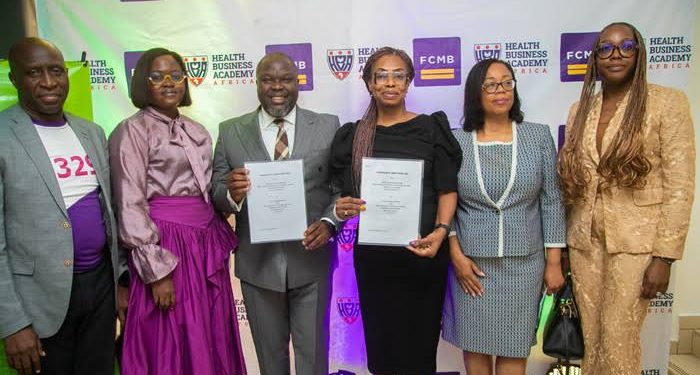The Health Business Academy (HBA) and First City Monument Bank (FCMB) have entered into a strategic partnership to strengthen Nigeria’s healthcare sector by equipping healthcare entrepreneurs with essential business training and tailored financial solutions. The agreement, formalized during a recent Memorandum of Understanding signing ceremony, seeks to close the persistent gaps in healthcare funding, education, and infrastructure across the country.
The initiative focuses on supporting healthcare professionals and startups with targeted financial literacy, capacity-building programmes, and exclusive banking services designed to help them scale sustainably.
Nnenna Jacob-Ogogo, Head of Women in Business at FCMB, emphasized the bank’s commitment to Nigeria’s healthcare growth. “We are very passionate about the healthcare industry because it is fundamental to Nigeria’s development,” she said. “Women make up a significant part of this sector, and through this partnership with HBA, we aim to create opportunities that help healthcare entrepreneurs access the right funding and training to grow their businesses sustainably.”
She noted that many startups in the healthcare space struggle with growth due to limited access to capital and inadequate business expertise. “FCMB is committed to bridging this gap by offering tailored banking products and subsidised educational programmes,” she added.
Wale Olajubu, Executive Director of the Health Business Academy, underlined the urgency of professional training and leadership development within the healthcare ecosystem. “Only a few healthcare professionals in Sub-Saharan Africa receive continuous professional development. This results in poor service delivery and the collapse of health institutions,” he said. He expressed optimism that the partnership with FCMB would help address these structural weaknesses and elevate business standards in the healthcare sector.
Adding to the discourse, former President of the Healthcare Federation of Nigeria and Chair of The Bridge Clinic, Pamela Ajayi, urged stakeholders to reimagine Nigeria as the healthcare hub of West Africa. She pointed to the pandemic as a wake-up call on the need for self-sufficiency. “India covers up to 90 per cent of its healthcare needs through local production. Nigeria imports between 70 to 90 per cent of its medical supplies. This dependency is not only risky—it limits our national potential,” she said.
Ajayi called for a return of skilled Nigerian healthcare professionals from the diaspora and highlighted emerging opportunities in areas like telemedicine, artificial intelligence, digital health, and local pharmaceutical manufacturing. She stressed the importance of public-private partnerships where the government funds care while the private sector drives service delivery, describing this model as critical to building a robust and future-ready healthcare system.
The FCMB-HBA collaboration represents a strategic step toward achieving that vision, combining financial empowerment with practical business training to foster innovation, resilience, and growth in Nigeria’s healthcare sector.










